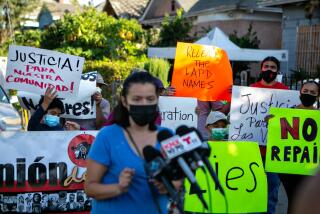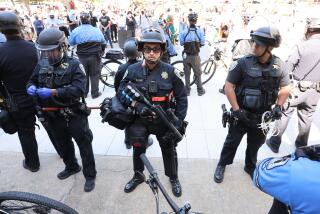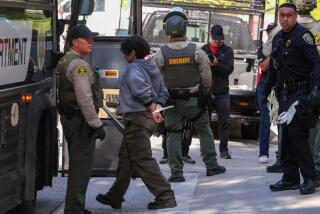Philadelphia to Open Inquiry Into Bombing of Radicals
- Share via
PHILADELPHIA — After an extensive search for evidence, a special mayoral commission begins public hearings today into the urban trauma and tragedy of the violent May 13 Philadelphia police confrontation with the radical group MOVE that left 11 people dead and 61 homes destroyed.
The commission, appointed by Mayor W. Wilson Goode, will try to answer the growing questions haunting the nation’s fifth largest city and its top officials since a police helicopter dropped a bomb on a barricaded MOVE house after a tense day of gun battles with the group.
The resulting fire raged for 65 minutes before firefighters moved in, and ultimately gutted two city blocks of wooden row houses in a crowded West Philadelphia neighborhood. The dead included seven adults and four children in the MOVE house. Some 236 people were left homeless.
“We’re trying to find out what happened and why,” said Carl E. Singley, commission counsel and dean of Temple University’s Law School. “We are trying to understand how the situation was allowed to result in so many deaths.”
Effect on Mayor Assessed
Several civic leaders said that Goode’s political future may be at stake as the monthlong inquiry focuses on who made key decisions before and during the tense police siege, which led to the worst residential fire in the city’s history.
“I think it will have a profound damaging effect on the mayor,” Ernest Jones, executive director of the Philadelphia Urban Coalition, said of the hearings. “I have a sense, and I think the public does, that the mayor knew much more than he’s admitted to.”
Goode initially took “full responsibility” for the police assault on the self-described “back-to-nature” revolutionaries, who had turned their house into a fortress and had annoyed neighbors with nightlong harangues over loudspeakers. But as new evidence has contradicted official accounts, Goode has distanced himself from his aides, saying that the use of a bomb was not “discussed with me.”
“Initially he said he was responsible and wasn’t looking for scapegoats,” said John W. Morris, lawyer for Goode’s police commissioner, Gregore J. Sambor. “His actions since then seem to be to the contrary.”
Blames Political Enemies
Goode’s spokesman, Karen Warrington, said that he wants the commission to “find the truth” and will be responsible for his actions. “People who were his political enemies have criticized him,” she said.
The fact-finding panel will focus on several key areas, according to Henry S. Ruth, a commission member and former Watergate special prosecutor.
“The question is why did we have to come to May 13?” said Ruth. “Why did they go in when everyone knew children were present? Why was that day chosen? Why were the explosives used? Who decided to use them and how? Why was the fire allowed to burn so long? Were the children seen as hostages? Why did only one woman and one child get out? What happened to the other children? Basically what happened?”
Most controversial, probably, is why the fire was allowed to burn more than an hour, and why only two persons escaped. Several witnesses reported at least four persons had tried to flee the burning house. How and why they returned to the house is unclear.
Two Theories Offered
“There are two possibilities,” said David S. Schrager, lawyer for Michael (Birdie Africa) Ward, the boy who escaped from the house and now lives with his natural father near Philadelphia. “One is that having left the house, they made the extraordinary decision to return through the flames to the garage. The other possibility is . . . they could have been shot or driven back by gunfire. We don’t know.”
Meanwhile, more than 90 workmen hired by the city were busy pouring concrete, hammering wood frames and putting up dry wall at the Osage Avenue site last week. Robert Hazen, head of the city’s Redevelopment Authority, said that he expects to meet the deadline to rebuild most of the homes by Christmas. “They’re going like crazy, said Hazen.
More to Read
Sign up for Essential California
The most important California stories and recommendations in your inbox every morning.
You may occasionally receive promotional content from the Los Angeles Times.














